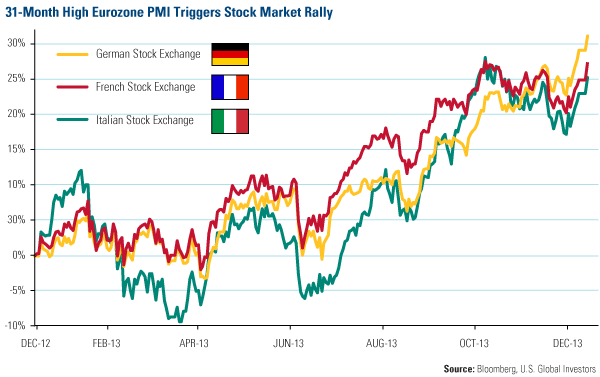Emerging Markets Radar (December 30, 2013)
Strengths
- The recent PMIs in Europe, where data showed growth in the eurozone’s manufacturing sector was at the highest in 31 months, were a big relief and showed the recovery is back on track. The upturn means that, over the final quarter, businesses saw the strongest growth since the first half of 2011, and have now enjoyed two consecutive quarters of growth. It is not surprising then that Germany's DAX ended this week at an all-time high, while France’s CAC index and Italy’s MIB index closed near 52-week highs. The confirmation of the recovery and subsequent equity market outperformance bode well for emerging Europe stocks as we head into the new year.
- After the People’s Bank of China open market operation on Tuesday, 7-day Shanghai Interbank Offered Rate (SHIBOR) stabilized at 5.067 percent on Friday, and the Shanghai Composite Index rose 1.4 percent.
- China’s economic growth this year is likely to come in at 7.6 percent, above the government’s 7.5 percent target, a report by the State Council was cited by the official Xinhua News Agency.
- China will issue licenses for mobile virtual networks, which will benefit internet social network and messaging operators.
- China property inventory stands at 11.1 months equivalent of sales, below the seven-year average of 11.5 months. The sector net asset value (NAV) discounts, price to earnings multiple, and price to book ratios are all down one standard deviation, which bodes well for a stock price rebound.
- Guangdong province may cancel administrative intervention on home purchases from next year, though it seems the local government has since backed away a little from this and says it will follow instructions from the central government in Beijing.
- Thailand current account surplus rose to $2.3 billion in November driven by a sharp drop in imports which was down 9.3 percent year-over-year.
- Taiwan kept its benchmark rate unchanged at 1.875 percent for 10-day loans due to low inflation.
- Singapore November inflation ticked up to 2.6 percent as expected.
Weaknesses
- Russia December Manufacturing PMI reading of 48.8 was the lowest in 4 years. Business conditions for manufacturers shows continued deterioration with the index contracting from 49.4 in November. A drop in export demand led to stagnation in new factory orders and revives the manufacturing growth concerns in the BRIC (Brazil, Russia, India, China) nations, according to HSBC. The index has now deteriorated for five out of the past six months.
- Reserve Bank of India chief Rajan announced the central bank had decided to keep rates on hold for a second month, even before the consumer price and retail inflation data for November were released. During the bank’s last meeting, the RBI surprised investors by keeping interest rates on hold despite data showing consumer prices in posted their biggest annual rise on record of 11.24 percent, while wholesale inflation hit a 14-month high.
- Auto makers with Japanese joint ventures may see their stock price retreat temporarily after the Japanese Prime Minister Abe ignited controversy by worshipping at the Yasukuni shrine.
- Private consumption in Thailand fell 2.4 percent on a year-over-year basis and 1.2 percent month-over-month in November. Private investment also dropped 7.87 percent year-over-year and 0.6 percent month-over-month. Manufacturing production fell 10.6 percent year-over-year, due to a high base last year.
- Singapore November industrial production was up 4.0 percent versus the market estimate of 5.3 percent.
- China industrial enterprises above designated size saw profit growth of 9.7 percent year-over-year in November, 5.4 percent lower than in October dragged by declining profits at state-owned enterprises.
- Taiwan November export growth stopped in November, while import growth was a negative 0.5 percent.
Opportunities
- The Bundesbank president and ECB Governing Council member Jens Weidmann said Friday in an interview that the ECB should hike interest rates if inflation risks rise in the eurozone. He pointed out that keeping rates low for an extended period of time could negatively affect eurozone economies' reform policies and added that low inflation pressures don't give a license for arbitrary monetary easing. His view seemed to reinforce the view that the European recovery is well in its tracks and can sustain a rate hike. As a result, the euro rallied, providing for an interesting case in the needed export driven growth economies of Central and Eastern Europe.
- International Monetary Fund (IMF) Managing Director Christine Lagarde said the budget deal reached in Washington and the Federal Reserve’s plan to taper its bond buying should increase confidence about the future. The IMF said it is preparing to bolster the outlook for developed economies for 2014. As a result, all 10 industry groups in the Emerging Markets Index rose on the expectation that external demand from a synchronized expansion in developed markets will drive a recovery in lagging emerging markets.
- As shown in the chart above, China’s demand for civilian helicopters is set to grow. Helicopters are now purchased for land and sea logistics. With vast land and long sea shorelines in China and a growing economy, the ownership of civilian helicopters is deemed to catch up with developed countries.
Threats
- Turkey stocks dropped, as the lira tumbled with foreign investors selling the nation’s debt on concern the political instability will worsen. In addition, European Union Enlargement Commissioner Stefan Fule said he was concerned by “the removal of a large number of police officers from their duties” and urged Turkey to “take all the necessary measures to ensure that allegations of wrongdoing are addressed without discrimination.” The EU warning threatens Turkey’s ambitions of joining the common market once again, following the condemnation by EU officials of Erdogan’s treatment of the protests that engulfed the country last summer.
- Russia’s Gazprom, the world’s biggest natural gas producer, announced its dividend will likely miss analysts estimates by about 25 percent as output stalls. The state-controlled company has failed to restore pre-recession output levels. In addition, the company’s profit margins suffered when Gazprom agreed to retroactive discounts for some European clients. Most recently, with the signature of a pact to normalize relations between Russia and Ukraine, Gazprom will be required to provide gas to Ukraine at subsidized prices, which are likely to add pressure to the already stressed profit margins.
- Continued political uncertainty has further dampened consumption and demand in Thailand. With the recent postponement of the February 2014 election, the market may continue to see short-term volatility. Nevertheless, a declining price/earnings multiple will prepare the market for a rebound.
















